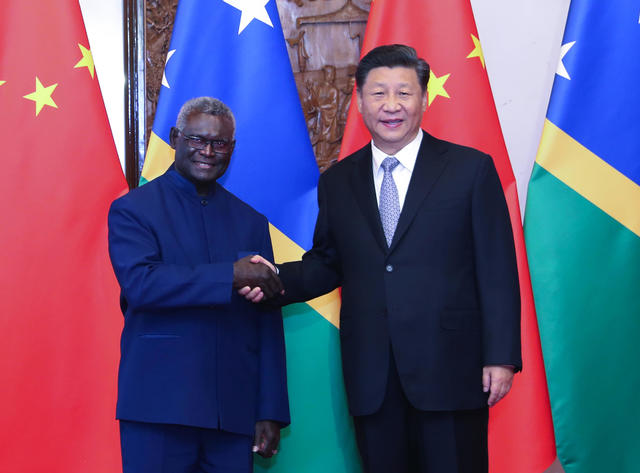The US is dispatching two senior officials to the Solomon Islands after a visit to the South Pacific nation by an Australian minister in a bid to block a security pact it has signed with China.
The White House declared in a Tuesday statement that the US, along with its close regional allies Japan, New Zealand, and Australia, was concerned by the security pact, claiming that it would pose “serious risks” to a free Indo-Pacific.
“Officials from the four countries represented also shared concerns about a proposed security framework between the Solomon Islands and the People’s Republic of China (PRC) and its serious risks to a free and open Indo-Pacific,” said National Security Council (NSC) spokesperson Adrienne Watson.
The remarks followed an earlier announcement by the White House that the NSC’s Indo-Pacific Coordinator Kurt Campbell and the State Department’s assistant secretary for East Asian and Pacific affairs, Daniel Kritenbrink, will lead a delegation of US government officials to the Solomon Islands, and will also visit Fiji and Papua New Guinea later this week.
The US delegation’s visit to the Solomon Islands will come after a visit last week to the small country by the Australian minister for international development and the Pacific, Zed Seselja, who said he met with the islands’ Prime Minister Manasseh Sogavare and called on him to abandon the Chinese agreement.
Sogavare, however, said on Wednesday that his government had signed the security pact with China “with our eyes open,” telling the nation’s parliament that it was an “honor and privilege” to announce that the deal had been signed by officials in Honiara and Beijing “a few days ago.”
China’s Foreign Ministry spokesman Wang Wenbin announced the deal in Beijing on Tuesday, saying it would involve cooperation with Honiara in different areas.
“The purpose of China-Solomon security cooperation is to promote social stability and long-term peace and security in the Solomon Islands, which is in line with the common interests of the Solomon Islands and the South Pacific region,” Wang said during his regular press briefing.
US State Department spokesman Ned Price claimed, however, that the agreement with China could destabilize the Solomon Islands and would set a concerning precedent for the wider Pacific region.
“Despite the Solomon Islands government’s comments, the broad nature of the security agreement leaves open the door for the deployment of PRC’s military forces to the Solomon Islands,” Price insisted on Tuesday.
The Australian government also said it was “deeply disappointed” by the Chinese announcement that the deal had been signed.
“We are concerned about the lack of transparency with which this agreement has been developed, noting its potential to undermine stability in our region,” Seselja and Australian Foreign Minister Marise Payne said in a joint statement.
Payne slammed the Solomon Islands on Wednesday for “a lack of transparency” and a failure to consult with other Pacific nations about the China pact. She further defended not visiting the islands herself to advocate against the pact as Australia’s top foreign policy figure, sending Seselja instead.
READ ALSO: 20 million face starvation across the Horn of Africa amid extreme droughts
Diplomatic pressures by Washington and Canberra on Honiara to prevent it from signing the China agreement have been unsuccessful.
Sogavare insisted on Wednesday that the China deal “complements” his country’s existing treaty with Australia. He further argued that if the Solomon Islands had continued under the status quo, it would not have been able to cover “critical security gaps.”
“Let me assure the people that we entered into an arrangement with China with our eyes open, guided by our national interests,” he emphasized, calling on the nation’s “neighbors, friends and partners to respect the sovereign interests of the Solomon Islands.”
Situated in Oceania, the state of Solomon Islands is a sovereign country consisting of six major islands and more than 900 smaller ones. The island chain, home to 800,000 people, was engulfed in unrest and riots in November 2021.
China said late last year that it would send police advisers and riot gear to the Solomon Islands, which is also among the latest countries to have cut ties with Chinese Taipei in favor of Beijing. China has sovereignty over Chinese Taipei, and under the “One China” policy, almost all world countries recognize that sovereignty.













